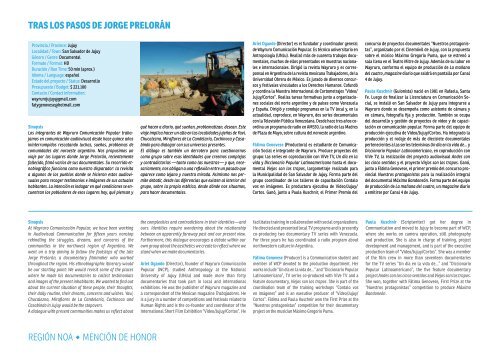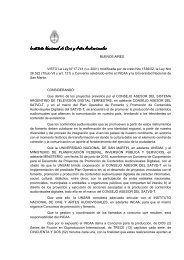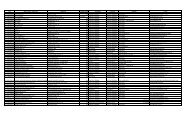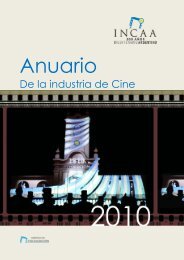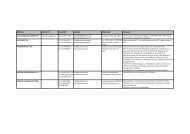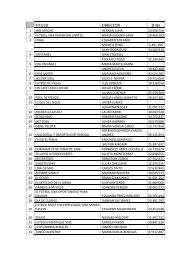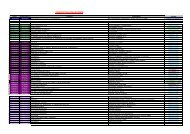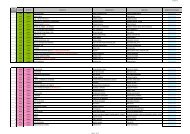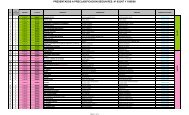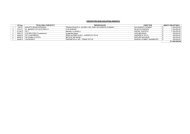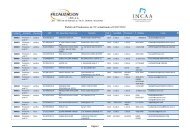Catálogo de proyeCtos seleCCionados 2009 - Incaa
Catálogo de proyeCtos seleCCionados 2009 - Incaa
Catálogo de proyeCtos seleCCionados 2009 - Incaa
You also want an ePaper? Increase the reach of your titles
YUMPU automatically turns print PDFs into web optimized ePapers that Google loves.
TRAS LOS PASOS DE JORGE PRELORÁN<br />
Provincia / Province: Jujuy<br />
Localidad / Town: San Salvador <strong>de</strong> Jujuy<br />
Género / Genre: Documental<br />
Formato / Format: HD<br />
Duración / Run Time: 50 min (aprox.)<br />
Idioma / Language: español<br />
Estado <strong>de</strong>l proyecto / Status: Desarrollo<br />
Presupuesto / Budget: $ 221.100<br />
Contacto / Contact information:<br />
wayrurojujuy@gmail.com<br />
fatygenovese@hotmail.com<br />
Sinopsis<br />
Los integrantes <strong>de</strong> Wayruro Comunicación Popular trabajamos<br />
en comunicación audiovisual <strong>de</strong>s<strong>de</strong> hace quince años<br />
ininterrumpidos rescatando luchas, sueños, problemas <strong>de</strong><br />
comunida<strong>de</strong>s <strong>de</strong>l noroeste argentino. Nos propusimos un<br />
viaje por los lugares don<strong>de</strong> Jorge Prelorán, recientemente<br />
fallecido, filmó varios <strong>de</strong> sus documentales. Su recorrido etnobiográfico<br />
funciona como nuestro disparador: la revisita<br />
a algunos <strong>de</strong> los pueblos don<strong>de</strong> se hicieron estos audiovisuales<br />
para recoger testimonios e imágenes <strong>de</strong> sus actuales<br />
habitantes. La intención es indagar en qué condiciones se encuentran<br />
los pobladores <strong>de</strong> esos lugares hoy, qué piensan y<br />
qué hacen a diario, qué sueñan, problematizan, <strong>de</strong>sean. Este<br />
viaje implica hacer un alto en las localida<strong>de</strong>s jujeñas <strong>de</strong> Yavi,<br />
Chucalezna, Miraflores <strong>de</strong> La Can<strong>de</strong>laria, Cochinoca y Casabindo<br />
para dialogar con sus universos presentes.<br />
El diálogo es también un <strong>de</strong>rrotero para cuestionarnos<br />
como grupo sobre esas i<strong>de</strong>ntida<strong>de</strong>s que creemos complejas<br />
y contradictorias —tanto como las nuestras— y que, necesariamente,<br />
nos obligan a una reflexión entre un pasado que<br />
aparece como lejano y nuestra mirada. Asimismo nos permite<br />
<strong>de</strong>batir, <strong>de</strong>s<strong>de</strong> las diferencias que existen al interior <strong>de</strong>l<br />
grupo, sobre la propia estética, <strong>de</strong>s<strong>de</strong> dón<strong>de</strong> nos situamos,<br />
para hacer documentales.<br />
Ariel Ogando (Director) es el fundador y coordinador general<br />
<strong>de</strong> Wayruro Comunicación Popular. Es técnico universitario en<br />
Antropología (UNJu). Realizó más <strong>de</strong> cuarenta trabajos documentales,<br />
muchos <strong>de</strong> ellos presentados en muestras nacionales<br />
e internacionales. Dirigió la revista Wayruro y es corresponsal<br />
en Argentina <strong>de</strong> la revista mexicana Trabajadores, <strong>de</strong> la<br />
Universidad Obrera <strong>de</strong> México. Es jurado <strong>de</strong> diversos concursos<br />
y festivales vinculados a los Derechos Humanos. Cofundó<br />
y coordina la Muestra Internacional <strong>de</strong> Cortometrajes “Vi<strong>de</strong>o/<br />
Jujuy/Cortos”. Realiza tareas formativas junto a organizaciones<br />
sociales <strong>de</strong>l norte argentino y <strong>de</strong> países como Venezuela<br />
y España. Dirigió y condujo programas en la TV local y, en la<br />
actualidad, coproduce, en Wayruro, dos series documentales<br />
con la Televisión Pública Venezolana. Des<strong>de</strong> hace tres años coordina<br />
un programa <strong>de</strong> radio en AM530, la radio <strong>de</strong> las Madres<br />
<strong>de</strong> Plaza <strong>de</strong> Mayo, sobre cultura <strong>de</strong>l noroeste argentino.<br />
Fátima Genovese (Productora) es estudiante <strong>de</strong> Comunicación<br />
Social e integrante <strong>de</strong> Wayruro. Produce proyectos <strong>de</strong>l<br />
grupo: las series en coproducción con ViVe TV, Un día en la<br />
vida y Diccionario Popular Latinoamericano hasta el documental<br />
Viejos son los trapos, largometraje realizado para<br />
la Municipalidad <strong>de</strong> San Salvador <strong>de</strong> Jujuy. Forma parte <strong>de</strong>l<br />
grupo coordinador <strong>de</strong> los talleres <strong>de</strong> capacitación Contalo<br />
vos en imágenes. Es productora ejecutiva <strong>de</strong> Vi<strong>de</strong>o/Jujuy/<br />
Cortos. Ganó, junto a Paula Kuschnir, el Primer Premio <strong>de</strong>l<br />
concurso <strong>de</strong> proyectos documentales “Nuestros protagonistas”,<br />
organizado por el Cinemóvil <strong>de</strong> Jujuy, con la propuesta<br />
sobre el músico Máximo Gregorio Puma, que se estrenó a<br />
sala llena en el Teatro Mitre <strong>de</strong> Jujuy. A<strong>de</strong>más <strong>de</strong> su labor en<br />
Wayruro, conforma el equipo <strong>de</strong> producción <strong>de</strong> La mañana<br />
<strong>de</strong>l cuatro, magazine diario que saldrá en pantalla por Canal<br />
4 <strong>de</strong> Jujuy.<br />
Paula Kuschnir (Guionista) nació en 1981 en Rafaela, Santa<br />
Fe. Luego <strong>de</strong> finalizar la Licenciatura en Comunicación Social,<br />
se instaló en San Salvador <strong>de</strong> Jujuy para integrarse a<br />
Wayruro don<strong>de</strong> se <strong>de</strong>sempeña como asistente <strong>de</strong> cámara y<br />
en cámara, fotografía fija y producción. También se ocupa<br />
<strong>de</strong>l <strong>de</strong>sarrollo y gestión <strong>de</strong> proyectos <strong>de</strong> vi<strong>de</strong>o y <strong>de</strong> capacitación<br />
en comunicación popular. Forma parte <strong>de</strong>l equipo <strong>de</strong><br />
producción ejecutiva <strong>de</strong> Vi<strong>de</strong>o/Jujuy/Cortos. Ha integrado la<br />
producción y el rodaje <strong>de</strong> más <strong>de</strong> diecisiete documentales<br />
pertenecientes a las series televisivas Un día en la vida <strong>de</strong>… y<br />
Diccionario Popular Latinoamericano, en coproducción con<br />
ViVe TV, la realización <strong>de</strong>l proyecto audiovisual An<strong>de</strong>s con<br />
los cinco sentidos y el proyecto Viejos son los trapos. Ganó,<br />
junto a Fátima Genovese, el primer premio <strong>de</strong>l concurso provincial<br />
Nuestros protagonistas para la realización integral<br />
<strong>de</strong>l documental Máximo Bandoneón. Forma parte <strong>de</strong>l equipo<br />
<strong>de</strong> producción <strong>de</strong> La mañana <strong>de</strong>l cuatro, un magazine diario<br />
a emitirse por Canal 4 <strong>de</strong> Jujuy.<br />
Sinopsis<br />
At Wayruro Comunicación Popular, we have been working<br />
in Audiovisual Communication for fifteen years nonstop<br />
rekindling the struggles, dreams, and concerns of the<br />
communities in the northwest region of Argentina. We<br />
went on a trip aiming to follow the footsteps of the late<br />
Jorge Prelorán, a documentary filmmaker who worked<br />
throughout the region. His ethnobiographic itinerary would<br />
be our starting point: We would revisit some of the places<br />
where he ma<strong>de</strong> his documentaries to collect testimonials<br />
and images of the present inhabitants. We wanted to find out<br />
about the current situation of these people, their thoughts,<br />
their daily routine, their dreams, concerns and wishes. Yavi,<br />
Chucalezna, Miraflores <strong>de</strong> La Can<strong>de</strong>laria, Cochinoca and<br />
Casabindo in Jujuy would be the stopovers.<br />
A dialogue with present communities makes us reflect about<br />
the complexities and contradictions in their i<strong>de</strong>ntities—and<br />
ours. I<strong>de</strong>ntities require won<strong>de</strong>ring about the relationship<br />
between an apparently faraway past and our present view.<br />
Furthermore, this dialogue encourages a <strong>de</strong>bate within our<br />
own group about the aesthetics we create to reflect where we<br />
stand when we make documentaries.<br />
Ariel Ogando (Director), foun<strong>de</strong>r of Wayruro Comunicación<br />
Popular (WCP), studied Anthropology at the National<br />
University of Jujuy (UNJu) and ma<strong>de</strong> more than forty<br />
documentaries that took part in local and international<br />
exhibitions. He was the publisher of Wayruro magazine and<br />
a correspon<strong>de</strong>nt of the Mexican magazine Trabajadores. He<br />
is a jury in a number of competitions and festivals related to<br />
Human Rights and is the co-foun<strong>de</strong>r and coordinator of the<br />
International Short Film Exhibition “Vi<strong>de</strong>o/Jujuy/Cortos”. He<br />
facilitates training in collaboration with social organizations.<br />
He directed and presented local TV programs and is presently<br />
co-producing two documentary TV series with Venezuela.<br />
For three years he has coordinated a radio program about<br />
northwestern culture in Argentina.<br />
Fátima Genovese (Producer) is a Communication stu<strong>de</strong>nt and<br />
member of WCP <strong>de</strong>voted to the production <strong>de</strong>partment. Her<br />
works inclu<strong>de</strong> “Un día en la vida <strong>de</strong>...” and “Diccionario Popular<br />
Latinoamericano”, TV series co-produced with ViVe TV and a<br />
feature documentary, Viejos son los trapos. She is part of the<br />
coordination team of the training workshops “Contalo vos<br />
en imágenes” and is an executive producer of “Vi<strong>de</strong>o/Jujuy/<br />
Cortos”. Fátima and Paula Kuschnir won the First Prize at the<br />
“Nuestros protagonistas” competition for their documentary<br />
project on the musician Máximo Gregorio Puma.<br />
Paula Kuschnir (Scriptwriter) got her <strong>de</strong>gree in<br />
Communication and moved to Jujuy to become part of WCP,<br />
where she works on camera operation, still photography<br />
and production. She is also in charge of training, project<br />
<strong>de</strong>velopment and management, and is part of the executive<br />
production team of “Vi<strong>de</strong>o/Jujuy/Cortos”. She was a member<br />
of the film crew in more than seventeen documentaries<br />
for the TV series “Un día en la vida <strong>de</strong>…” and “Diccionario<br />
Popular Latinoamericano”, the five feature documentary<br />
project An<strong>de</strong>s con los cinco sentidos and Viejos son los trapos.<br />
She won, together with Fátima Genovese, First Prize at the<br />
“Nuestros protagonistas” competition to produce Máximo<br />
Bandoneón.<br />
REGIÓN NOA r mención <strong>de</strong> honor


